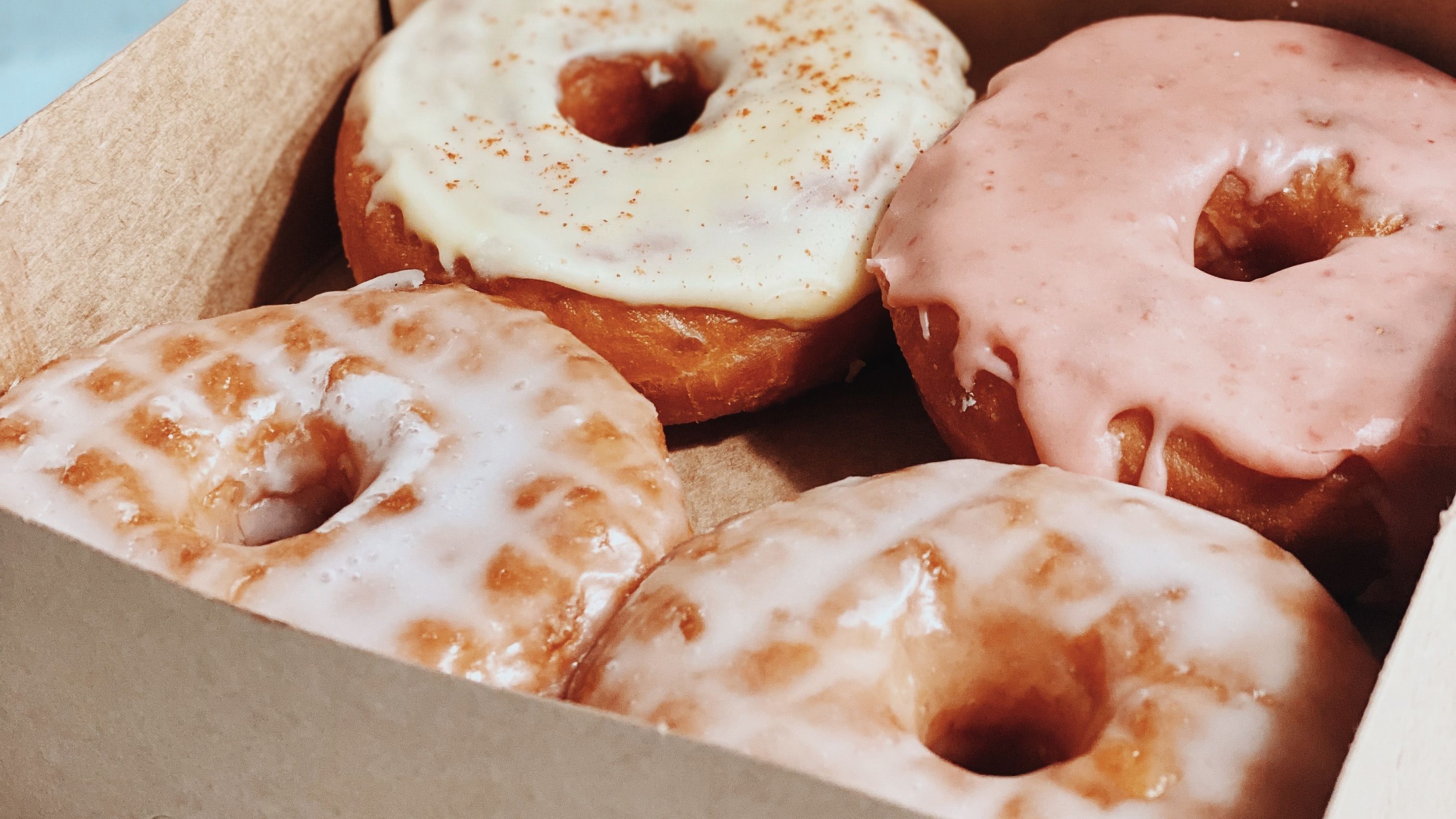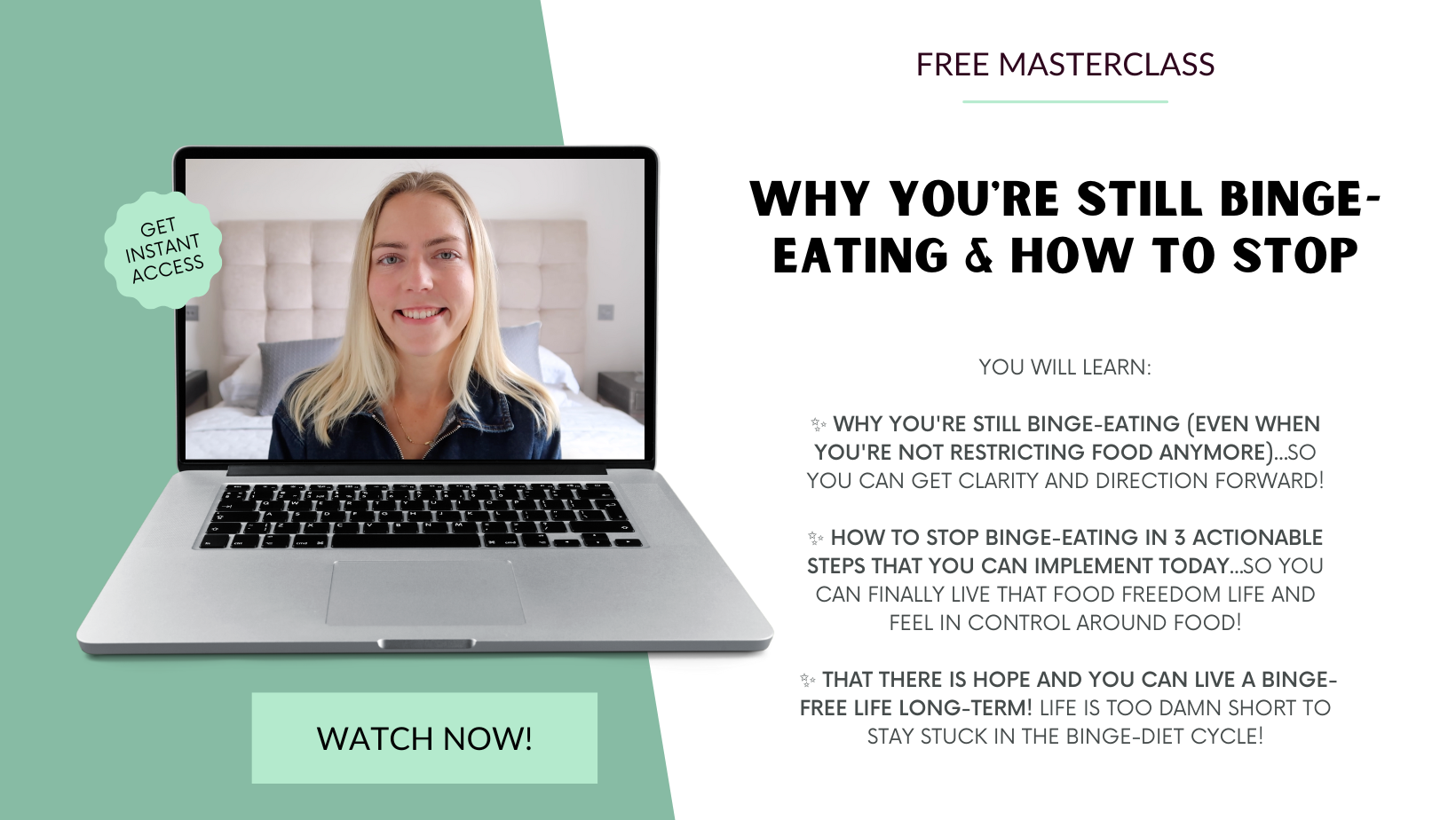How To Stop Overeating Every Meal
Jan 17, 2023
Are you consistently overeating in most meals? You’re not necessarily bingeing but often eating more than you know your body needs.
You may feel like you just need to cut out these foods that you overeat because you just can’t seem to eat them in moderation. But you also love these foods so it feels like such a sacrifice (and pretty unrealistic) to cut them out for good.
In this article, we’ll talk about:
- What overeating is
- Common reasons for overeating
- How to stop overeating so often
- Whether the 30 Day Reboot is helpful for overeaters
WHAT IS OVEREATING
When compared to binge eating, overeating is characterised by:
- Eating past fullness where you might be uncomfortably full.
- More generally, overeating is consuming more calories than your body is burning.
Whereas binge eating looks like:
- Eating a very large amount of calories in one sitting (typically 1,500 or more calories).
- Often eating alone, in secret, very quickly.
- Feeling like there is no way to stop the binge until it’s over.
- Feeling extremely distressed emotionally afterwards full of shame, regret, disgust, panic.
There is definitely an overlap between overeating and binge eating. You can overeat most of your meals and still binge other times in the week. You could also not binge eat ever yet still overeat often.
COMMON REASONS FOR OVEREATING
Some common reasons why people overeat are:
- Finding comfort in food: Some people really love the feeling that food can give them from the warmth to the feeling of being full, to the more emotional side of it - pleasure, joy, or even escape.
- Self-loathing: Others may overeat to punish themselves. Overeating (and hence weight gain) can sometimes be a form of protection where the thinking is ‘If I keep gaining weight, no one will want me and I’ll be safe from hurt from others’. This is very common in victims of sexual and relationship trauma.
- Fuck it mentality: Some people overeat often because they’ve been dieting so continuously and it hasn’t worked out so they figure ‘I might as well just enjoy the food then!’. A form of self-sabotage rooted in frustration.
- Boredom: A very common reason for overeating is boredom as food is such an easy and effective way to solve boredom temporarily.
- Being alone: Some overeat out of loneliness as a coping mechanism. While others overeat when alone because normally when around others like colleagues or friends, they feel they have to control themselves (perhaps because they’re overweight and fear judgement from others regarding how much food they eat). So once they’re alone, they can let loose and overeat.
- Under-eating: Similar to binge eating, people might overeat due to undereating earlier in the day or week.
HOW TO STOP OVEREATING OFTEN
Let me preface by saying - no one is perfect, it’s ok to overeat sometimes, to eat past fullness, to indulge in something so delicious that you’d rather overeat a little than stop. We’re all human!
Food is delicious! So, in my opinion, we don’t have to aim for perfection where we never overeat.
What we do want is to feel like we’re in the driver’s seat regarding when and how much we overeat (not the food taking control). And that the frequency/intensity of overeating isn’t negatively affecting your life.
Let’s revisit the common triggers of overeating and suggest solutions:
Finding comfort in food:
It’s ok to find comfort in food but you must put in place boundaries for yourself so that you’re not creating more discomfort for yourself by seeking comfort in food. I know that the idea of eating a smaller bowl of pasta can feel like deprivation - like it just won’t hit the spot for you - so take small steps with this.
I advise reducing the portion by 5% - something so small that it hardly feels noticeable. Let yourself fully derive comfort from the food, enjoy it! When you finish the bowl - remind yourself how delightful it was - avoiding thoughts of ‘uh, I wish I could have more!’.
The aim is to normalise eating slightly smaller portions over time getting to the point where your 'normal' meal size is not overeating.
Also, work to seek out other sources of comfort in your life.
Self-loathing:
Overeating to handle feelings of self-loathing is self-sabotage - so let’s instead solve at the root of that feeling. This involves both learning how to face these feelings (as they won’t go away overnight) in a healthy way, but also alleviating the feeling and moving towards feelings of neutrality or even positivity towards yourself.
For that I highly recommend my course Body Love Academy - where we transform how you feel about yourself and improve your feelings of self-worth.
Fuck it mentality:
The solution here is to get off this rollercoaster of extreme dieting and weight loss obsession. When you find a more balanced middle ground with food, weight and your mindset - there’s less room for a ‘fuck it’ mentality. Why say ‘fuck it, let me just eat the whole box of donuts’ if you’ve already had one the other day, you’ve already eaten pleasureful foods today, and know you can have them tomorrow too?
Learn more about reaching this middle ground in the 30 Day Reboot - my food freedom course.
Boredom:
Similar to the feelings of self-loathing - we must learn how to cope with uncomfortable feelings and to help alleviate them too. Get my useful 5-step framework to facing difficult feelings in this masterclass video for free.
When it comes to boredom, if you’re frequently feeling bored - it’s often a sign of not living as your authentic self. I.e. you’re spending too much time idle, scrolling on social media, not following your passions and what truly lights you up.
It doesn’t have to mean filling every spare second with life-changing projects - it can mean smaller moments that still align with your truest self like tidying up your desk (if your authentic self loves a fresh home), exploring new music on Spotify (if you love creativity), creating a Pinterest board to help decorate your living room (if you enjoy design) etc. You get the gist! So think about 4 core values that you feel match you authentically (no ego here).
For example, mine is Fun/Play/Exploration, Connection/Belonging, Creativity/Design, Growth/Learning.
Being alone:
If you find yourself ‘letting loose’ when alone because you’re controlling your food desires while around others - it’s time return to honouring your own needs and desires at all times. To stop controlling others' judgements of yours by changing who you are. To stop people-pleasing.
Make a conscious effort the next time that you’re eating around others to check in with what you truly want - what do you want to order, how much do you want to eat - and follow that.
When you respect your needs throughout the day, there’ll be less need to unload once finally alone.
Undereating:
This is worked on thoroughly in the 30 Day Reboot - particularly getting to the root of why you’re undereating - but in its simplest form, my advice is to commit to eating 3 nourishing, satiating, delicious meals every day for the next 2 weeks and watch your overeating habit lessen!
If you need more structured help to stop overeating and find food freedom - take a look at the 30 Day Reboot - my signature food freedom course.
With Love
Brid
Start your food and body healing journey with the FREE masterclass
"Why You're Still Binge-Eating & How To Stop"


